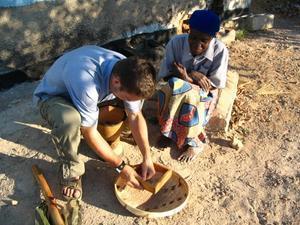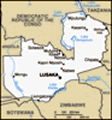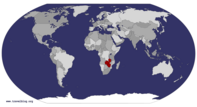Advertisement
Published: July 20th 2005

 Basankwa, Basankwa!
Basankwa, Basankwa!
Although she doesn't show it that often, I know that deep down inside Baneene likes meRomantic Zambia: Becoming a woman for a day
The purpose of this day was for me to start to get a bit of a feel for some of the typical tasks that a woman in Zambia does everyday. Just as how it takes an enormous amount of time and effort to deeply integrate fully into a culture, it also will take a lot more then spending a single day doing a few tasks that women do everyday to really understand what their lives are like. Nonetheless, it was to be a first step and if nothing else at least I would
So, my day as a woman awoke with the sunrise. Then grabbing my little bundle of straw, I swept out all the dirt out from inside my house and then swept all that dirt away from the front of the house so that it didn’t get all the dirt that was already there any more dirty. Baneene (my African Nana) was also out on her step doing the same. Seeing me sweeping, she made her way over to me shaking her head as usual and sharing her deep Bemban morning wisdom (read: punishing lecture, yelling while hoping up

 Me and my Bamaama
Me and my Bamaama
Me and my Zambian mother posing beside a giant metal wrecking ball used to clear out trees during the building of Kariba damna and flooding of Kariba Lake and down and shaking her breasts at me).
After sweeping, I then went and took my washing bucket to the bore well located about 50m away from my door, waited my turn, shoed away all the little children who didn’t want the mukuwa (Tonga for: “white man”) filling up his own water, finally got to the front of the line and filled my tiny bucket, picked it up and then carried it back to my place on my head. Every lady I met on the way back fell to the ground laughing in absolute hysterics, but I maintained my pride, kept my head up (maybe a little kinked to the side as well) and tried to not let it get to me.
Lesson 1: Carrying stuff on your head is really difficult, especially if
a) you’re not an African woman, or
b) you never attended beauty school training (hey Dad, bet you’re kicking yourself now for convincing mom to put me in hockey instead)
Anyways, that water was to be used for all my daily usage. Luckily, if I ever needed more water it isn’t that far to go. Unfortunately, most women here have to walk 100 times that distance everyday to get their water, not to mention that they also usually are gathering and carrying on their heads enough water for an entire family instead of just lil’ ol’ me. Baneene watched as I came back to the house and again started shaking her head at me saying “Basankwa, Basankwa” (literally translated as “Boy, Boy”, and with the connotation that what I was doing was definitely not a task that a boy should be doing).
After picking some fruit for breakfast, it was time to start doing laundry. I filled some water up in my washing bucket, set down my carved elephant stool, grabbed my scrubbing soap bar, rolled up my sleeves and started scrubbing. It’s amazing how even though I should have learnt from all the grey shirts I returned home from India with, that whatever you bring with you is never going to get as clean as it was in the past. I obviously didn’t as evidence of all the white clothes I still brought with me. So I scrubbed and scrubbed and scrubbed till my fingers were completely pruned and my scrubbing soap bar was more of a scrubbing soap pick. Every time I got tired I was sit up and look around and right there shaking her head at me as usual was good ol’ Baneene saying “Basankwa, Basankwa”. At the time, I decided that it was to her detriment to doubt me, skepticism was my motivation to get back to scrubbing, I sure as hell wasn’t going to let this brittle old lady deter me. So back to the washing pale I went, scrubbing, scrubbing, scrubbing. Now, As romantic as sweating in the scorching African sun scrubbing at a single tomato stain for 10 minutes sounds, it’s not, it sucks. My only saving grace, was that I could faintly hear the voices of a lovely chorus of African women singing somewhere else in town, which at least gave the scrubbing an ambiance of tolerance.
Funny, in between all the scrubbing, I’d say at least a dozen men who were passing by the ditch across from my place would stop, take in what was happening, come over to me, look at me in astonished puzzlement, ask where my wife was, shake their heads when they found out I didn’t have at least one (three would have been better), shake their heads even harder when they found out I wasn’t interested in marrying their sister/cousin, and then leave in a disgruntled huff when they found out I wasn’t interested in getting any sort of wife/wives during my time here.
Lesson 2: If you are ever looking for a wife/wives in Choma, just start scrubbing.
When I was almost done my laundry, the singing that I had been hearing the whole time and kind of had fallen into a trance with, started to pick up in intensity. I decided that my hands could use a bit of a break to regain some of the feeling in them, so I checked out the sound. I turned the corner around the street what do I see in front of me but a gigantic circle of traditionally clothed women all chanting and dancing around two boys banging on the drums. Entranced, I watched them holler and chant in beautiful chords and syncrocity (it is so a word). Naively thinking I could watch them from afar, I was quickly awakened out of my trance when one of them spotted me from afar, shouted “MUZUNGU (Nyanja word for “white man”), and then the entire circle floated it’s way unsuspectingly towards me as if it were a carnivorous predator quietly stalking its prey. I was instantly devoured into the circle and before I knew it I had a Cerenje wrapped around my waist and my hips were moving in ways they had never dreamed of moving.
Lesson 3 (actually more of a question I’m still researching): Have I mentioned before how I don’t understand how African women move their hips. It’s as if they have elastic springs in places where I’m sure I only have bone, someone should do some x-rays to find out.
Anyways, we danced and sang and drummed together for at least an hour and I think if they all hadn’t stopped to go to the bore well for water, I would still be there. Definitely one of those things you don’t just run into when you’re doing your laundry in Canada. But grudgingly, I knew I had laundry to finish so I returned back to my stool, grabbed my scrubbing soap stick and completed washing and hanging my laundry on the clothesline.
After that was done I was starting to gain a bit of an appetite. So, the next step in becoming a woman here in Choma was to cook. But it wasn’t just going to be any ordinary cooking since I cook everyday here anyways. Today was going to be a special cooking day as I was going to attempt to cook this super scrumptious sponge-like cake thingy that is impossible to accurately describe until you actually try it, but it almost tastes like meat which is why it is nick-named “African Bologna” (pronounced Ball-own-ee for you phoeneticians out there). And although it looks like meat, tastes like meat, feels like meet and is even called a type of meat, it contains absolutely no meat. Today, I was going to make CHIKONDA! I had never made chikonda before, but I had sort of seen my Bamaama (African Mother) make it and taken some notes so I figured it couldn’t be that hard (cough cough: foreshadowing).
The first step in making Chikonda is going to the market to buy all your ingredients. So off I journeyed to the rickety old traditional Makalanguzu market (literally translated as “market for the strong”). It is called this because the people who sell things at this market have endured through all sorts of government crackdowns trying shut it down or force it’s inhabitants out of town. But as most informal markets do, it found a way to survive and now the authorities have given up trying to shut it down and have just accepted its existence. Walking through the market, I used my very broken Tonga to buy groundnuts (peanuts), salt, a powder sort of like baking soda, and finally at the very end of the market, beyond all the nicer wood built stands with plastic roofing, sitting on the dirt with only a empty maize sack, was a single lady with what look like tiny dirty potatoes in front of her. These tubers are the magic ingredient for the dish and are also aptly named Chikanda.
I returned back to the house and set up my cooking tools outside. A large pounding stick, a wooden mortar to do the pounding in, a sift, a woven basket to catch what was sifted, a metal brazer (miniature cooking stove), some charcoal, some twigs and sticks, a match, a metal pot with some water, and the ever trusty Nsima spoon.
The next step was to take the groundnuts and pound them in my mortar and pestle. So I put down my elephant stool, put some nuts into the mortar and started pounding away as hard as I could. Baneene see’s this and goes absolutely bezerk. She starts waving her arms in the air, shaking her head and again yells “Basankwa Basankwa”. I ignore her as I again feel that she is saying this only because she has a traditional belief that men shouldn’t cook. I continue pounding away at the nuts, hammering them as hard as I can to get them ground up real good. Baneene keeps making grabs for my pounding stick and is yelling all sorts of Bemban things at me. But I stay strong, deflect the attacks, and keep on pounding, trying to show her that boys too can pound. After I’ve pounded the groundnuts in oblivion, I then try to sift them as to separate the small pieces from the bigger chunks so I can go back a pound the chunks again. Except when pounding the nuts, the oil that gets extracted mixed with the dry powder and made a mushy substance, kind of like dry clumpy peanut butter. Now, I’m never going to be one to complain about anything that could even belong to the same species as peanut butter, but it just wasn’t what I needed to make chikonda. Chikonda needs soft, dry fine peanut powder. My Bamaama came over to watch what I was doing and see’s my problem. She laughs at me and says that I was pounding the groundnuts way too hard and that what Baneene was trying to explain to me was that you need to pound the nuts gently and with a soft touch so as not to extract any of the oil from them and still get a fine powder.
Lesson 4: Never underestimate a woman’s touch
Lesson 5: I really need to stop being such an arrogant man
After swallowing my pride and taking some pounding lessons from Baneene, I re-pounded the ground nuts.
The next step is to chop, dry and pound the chikanda roots. Except this time I actually was supposed to pound the crap out of them. After that it was time to start cooking. Using the twigs, sticks and charcoal I got the fire going inside the brazer. Then, to get it super hot and stoked, I took the blazer in my hand and started to swing it back and forth to get air flowing through it. My friend and fellow EWB volunteer on the other side of Zambia showed me a way of really getting it going by instead of just rocking the blazer back and forth, you swing it in a full windmill motion, making sure you swing it fast enough that the scorching hot charcoal doesn’t dump on your head when it is upside down. Well, Baneene screamed and almost fainted when I started swinging this charcoal stove around and around. This was too much for her so she had to go pretend to rake in the garden or else she was going to blow from being so furious.
Cooking the chikanda isn’t really that difficult, over the charcoal stove you boil water and add the pounded nuts and chikanda and a little soda and salt. You then stir it like you’re cooking the Zambian staple meal Nsima, that is until it is thick like the mashed potatoes I make at home but also lumpless, not like the mashed potatoes I make back home. The brilliance in the cooking process comes at the end. After you’ve got this mush all thick and lumpless, you let it sit on the fire for a bit so the bottom gets hard and then what you do is remove the pot from the charcoal fire, take your metal lid for the pot and turn it upside down and place it back on the pot (making sure the lid is a metal one WITHOUT a plastic lid as I used). Then, you take some of the hot charcoal out of the brazer, place it on top of the pot lid. This effectively turns the pot into a stove which ends up cooking the top of the Chikanda. I know! Completely brilliant! Yep, so, after letting it cook for a good amount of time you add a little water to cool the edges and what you end up removing is a giant cake like lump of something that closely resembles a cake. I gloatingly served it to my Bamaama, my neighbors, the lady passing by on the street and everyone I could find. Everyone ate it super quickly but when there was only one piece left I realized there was somebody who hadn’t had any yet. I went inside and sitting on the cement floor on her typical empty maize bag was Baneene trying to ignore me. I reached out and offered her the last piece of the chikanda. She looked at me in a way that said “You expect me to eat this?” I kept insisting, and finally after making the best sad puppy dog face I could muster, she grudgingly took the piece, broke off a small chunk, put it in her mouth, chewed for a while…..no expression…..chewed some more…..still no expression…..her eyes then turned back to me…….she reached out as if maybe to hit me……..but instead grabbed the remaining chunk of Chikanda, shoved it into her mouth and chewed with a huge smile. I burst out laughing and started bragging to my Bamaama that it must be good if Baneene approves. Bamaama then asked Baneene in Bemba what she thought of it and Baneene replied. Bamaama then translated the answer to me……too much nuts …… I’m sure no pun was intended.
=^)
Advertisement
Tot: 0.067s; Tpl: 0.012s; cc: 9; qc: 25; dbt: 0.0424s; 1; m:domysql w:travelblog (10.17.0.13); sld: 1;
; mem: 1.1mb











